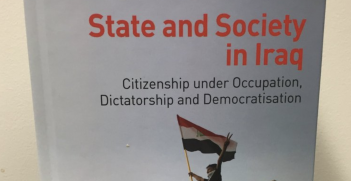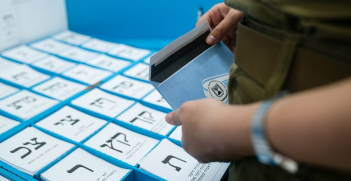“Intelligence Failure”: Forging A Middle Eastern Security Belt of Trusted Allies

Kurdistan is there: a reliable, battle-tested partner for developing a truly secure regional Middle East. Its resolute dedication, proven resilience, and adept management of security issues, along with its leadership in tackling challenges, makes it an indispensable ally in the pursuit of lasting peace and safety across the Middle East.
In the ever-turbulent landscape of the Middle East, two ongoing events are seemingly unrelated: Turkey’s recurrent invasions into Western Kurdistan (Rojava) and Syria, and the ongoing Hamas’ attack — supported at least tacitly by Iran, Qatar, and Turkey — on Israel. While these events may appear disconnected, they are symptomatic of a broader issue — the divergent approaches of Western powers, particularly the United States, the United Kingdom, and Europe, in dealing with their allies in the region.
The Kurds and Israelis both count the United States as a staunch ally. However, while support for the latter is unequivocal, the former often finds itself standing alone when invaded by Turkey and Iran. This discrepancy prompts us to question whether it is the non-state status of the Kurds, in contrast to Israel’s recognised statehood, that underpins this divergence in Western foreign policies.
Peace and security are connected across the Middle East. Armed actions and cross-border incursions that undermine the security and stability in segments of Kurdistan create a climate of lowered expectations that degrades sovereignty in general. Illegal violence in one place spreads like a contagion. That is how Israel’s peace and security can be eroded by actions which may occur at a remove, but encourage by example. Security and peace have nothing to do with the legal status of the West’s allies.
Turkish strikes on Kurdistani segments, including over 145 critical civilian infrastructural locations in Western Kurdistan, amount to war crimes as per the 1949 Geneva Conventions and Article 8 of the Rome Statute. These crimes further include the killing of children, women, internal security personnel, and anti-narcotics forces. Attacks on water supplies and pumping stations, power plants, energy facilities, grain silos, factories, schools, and hospitals have imposed suffering on at least two million innocent people. The goal of these attacks is to annihilate the existence of Kurdish self-rule in Western Kurdistan, which has served as a safe haven for all since 2012.
The lack of any effective American and Western response hampers peaceful international relations and threatens to undermine the peace, security, and stability in the region. In an increasingly interconnected world, problems in one region can have far-reaching consequences for the entire international community. Western countries are seen as having a stake in global stability, given their economic and political interdependence with other nations.
It is worth noting that both the Kurds and Israelis have experienced aggression firsthand. Kurds do not expect other nations to fight their battles for them. This is also the case with Israelis. However, the United States is expected, and it is in its best interest, to support all its allies in defending themselves against the actions of armed aggressors. A shared need for security forms the basis for cooperation among these reliable allies. The US can play a decisive role in establishing such a bond among Israelis, and in building lasting Kurdish self-rule in Western Kurdistan and the Kurdistan Regional Government of Southern Kurdistan (in Iraq). This collaboration makes the removal of terrorist groups more workable for the Americans, Kurds, and Israelis. The Kurds, although a non-state actor, have consistently demonstrated their unwavering commitment as a steadfast ally of the Western nations. With a track record of successfully confronting security challenges, the Kurdistani segments’ commitment to regional and global stability remains unshakable, underpinned by consequential intelligence collaboration within the global coalition against terrorism and extremism.
While the Kurds’ stateless status may present limitations on the actions that the Western world can take, it is crucial to acknowledge that lasting peace in the region remains elusive until Kurdistan is formally recognised. The lack of an independent Kurdistan has perpetuated regional instability, as it fuels grievances and conflicts in the region. Recognising Kurdistan as a sovereign state would not only address a longstanding injustice, but could also serve as a catalyst for regional stability.
In light of these challenges, as well as the Israel issue, Washington has a chance to forge a security belt — through a tripartite agreement — among the Kurds, Israelis, and Americans. This security belt should not only encompass military cooperation but also extend to intelligence sharing, diplomatic efforts, and the joint pursuit of peace in the Middle East. In essence, the establishment of such a security belt has the potential to provide a proactive strategic response to the “intelligence failure” which has become apparent with Hamas’ surprise assault on Israel.
By establishing a robust security alliance, the United States can leverage its influence to ensure that its allies in the Middle East are protected and supported consistently. This will not only serve the interests of the Kurds, Israelis, and Americans but also contribute to the broader goals of peace and security in the region. Kurds’ dedication to shared values, their resolute stance against terrorism, and their commitment to democratic principles highlight their significance to broader regional security.
The divergent approaches of Western powers in the Middle East must be addressed to create a more stable and secure region. The shared experiences and common needs of the Kurds, Israelis, and Americans provide a strong foundation for cooperation to encompass intelligence sharing, joint regional operations, and other potential collaborative efforts. It is time for Western nations to prioritise collective security and work together to foster a peaceful and secure region. The forging of a security belt among trusted allies is not only a strategic imperative but a moral obligation to promote peace and prosperity in the Middle East with a new emerging landscape.
Dr Loqman Radpey is an independent researcher, based in Scotland. Over the past decade, he has written extensively about the legal status of the Kurdistan question and the application of international law to the right to self-determination of the Kurdish nation.
This article is published under a Creative Commons License and may be republished with attribution.





